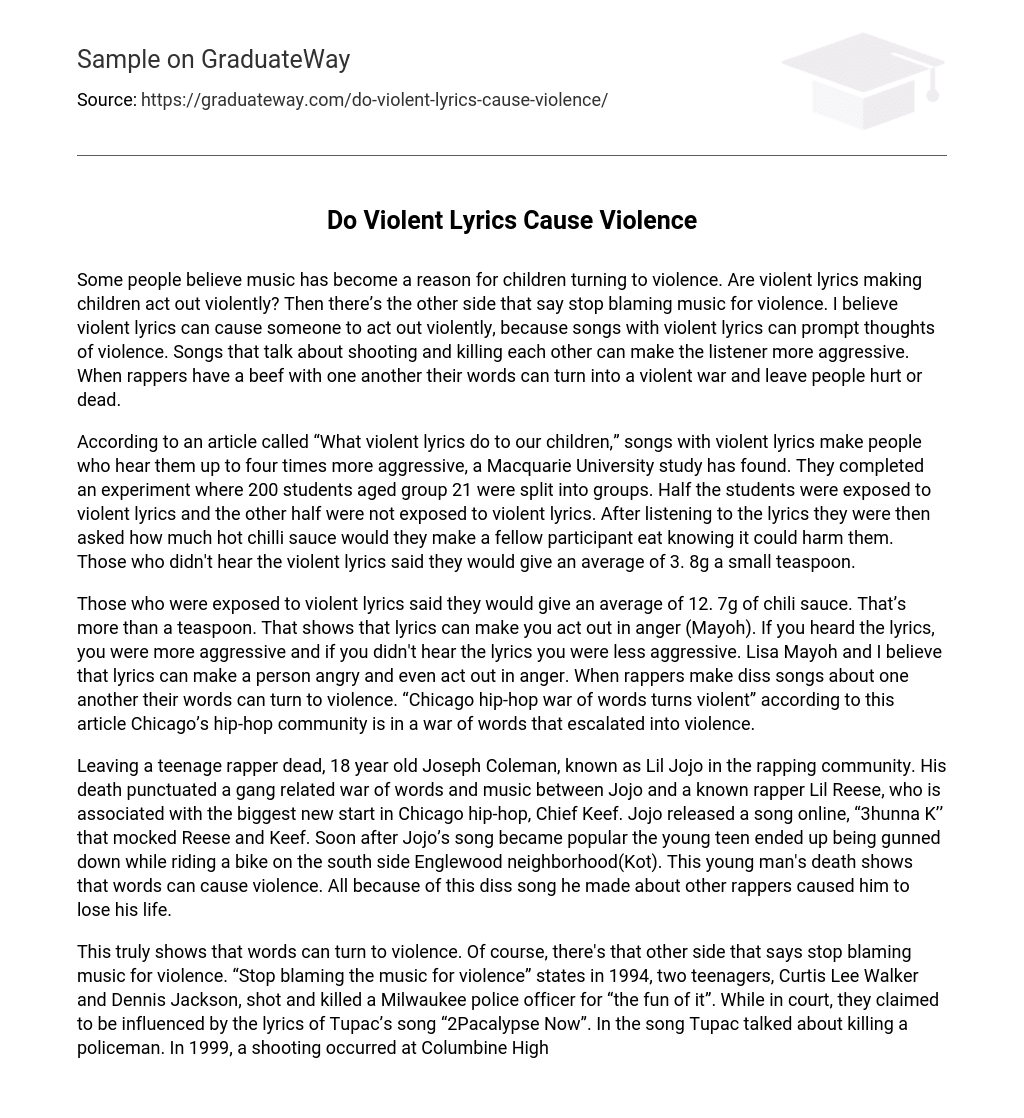There is a debate about whether music, specifically violent lyrics, influences children to become violent. While some argue against blaming music for violence, I personally believe that violent lyrics can indeed lead to violent behavior. Songs containing violent lyrics can trigger aggressive thoughts in the listener, especially when the lyrics involve shooting and killing. Additionally, when rappers engage in disputes, their words can escalate into a violent conflict resulting in harm or even fatalities.
According to a study conducted by Macquarie University titled “What violent lyrics do to our children,” songs containing violent lyrics were found to increase aggression in listeners up to four times. The study involved 200 participants aged 21, who were divided into two groups. One group was exposed to violent lyrics, while the other group was not. After listening to the lyrics, participants were asked how much hot chilli sauce they would make a fellow participant consume, despite knowing it could be harmful. The group not exposed to violent lyrics said they would administer an average of 3.8g, equivalent to a small teaspoon.
According to a study conducted by Mayoh, individuals exposed to violent lyrics were found to be more aggressive, as demonstrated by their willingness to provide an average of 12.7g of chili sauce, which exceeds the measure of a teaspoon. This indicates that lyrics have the power to incite anger and provoke aggressive behavior. Mayoh and I share the belief that lyrics possess the ability to elicit anger and instigate acts of aggression. This notion is further supported by instances in which rap artists exchange diss songs against each other, resulting in their words transforming into physical violence. A recent article highlights the ongoing conflict within Chicago’s hip-hop community, in which a war of words escalated into actual violent confrontations.
The death of 18-year-old Joseph Coleman, also known as Lil Jojo in the rapping community, resulted from a gang-related feud expressed through music and words. Lil Jojo’s demise occurred amidst a war of words between him and Lil Reese, an established rapper associated with Chief Keef, a prominent figure in Chicago hip-hop. Lil Jojo created a song titled “3hunna K'” which openly mocked Reese and Keef. Upon gaining popularity, this song ultimately led to Lil Jojo being fatally shot while riding his bike in the Englewood neighborhood on Chicago’s south side. This tragedy highlights the potential violence that can arise from verbal conflicts, as his diss track ultimately cost him his life.
This demonstrates the power of words to incite violence. Some argue against blaming music for acts of aggression. In 1994, adolescents Curtis Lee Walker and Dennis Jackson fatally shot a Milwaukee police officer for amusement. Surprisingly, they claimed during the trial that they were influenced by the lyrics of Tupac’s track “2Pacalypse Now,” which discusses killing a police officer. Moreover, in 1999, Eric Harris and Dylan Klebold, two seniors at Columbine High School, killed 12 students and one teacher before taking their own lives.
Media reports attributed the shooting to Marilyn Manson’s dark lyrics, but failed to mention Walker’s extensive criminal background involving drugs, burglary, and weapons crimes. USA Today disclosed that Harris and Klebold suffered from severe psychological problems, with psychologists characterizing Harris as a cold-blooded predator. Nevertheless, there are those who argue against music being a cause of violence and instead view it as a medium for emotional expression. For example, individuals may listen to sad songs when feeling depressed and opt for violent ones when experiencing anger.
School Resource Officer Keith Gardner argues that the violence was already present and that music is not the cause of it (Reiss). However, I personally hold the belief that music indeed influences violence. According to Gardner, the boys had preexisting issues, which means that the violent lyrics only affected them afterwards. Individuals who are already highly violent are not impacted by violent lyrics. A concrete example is when you expose a 3 or 4 year old child to Power Rangers, a television show they have never seen before. Afterward, they are likely to engage in more aggressive play with their peers.
When children watch television, particularly the show Barney, they play harmoniously with each other. This finding suggests that the children’s aggressive behavior following Power Rangers is influenced by the program. Unlike Power Rangers, Barney is a tranquil and interactive show that promotes collaboration. It is intriguing to ponder why television programs can influence children’s conduct but music does not have a similar impact on individuals’ inclination towards violence.
A recent study published by the American Psychological Association states that listening to violent lyrics can result in heightened aggression. This effect is specifically linked to the explicit content within the lyrics. For example, if individuals listen to a song called “Slap A Ho,” it is likely that they will feel inclined to physically harm someone afterwards. Reflecting on my own experiences, during my younger years, I used to watch wrestling with my male cousins. Following the conclusion of the show, we would frequently engage in lighthearted wrestling matches ourselves.
On a typical day without watching wrestling, we were harmonious. If television can provoke aggression, then the same goes for listening to violent lyrics. While it may not lead someone to murder, it can certainly instigate aggression. People have varying opinions on this issue. Some find my perspective absurd, asserting that music cannot prompt violence. However, there are individuals like me who believe that music can trigger violent behavior and harm others. Ultimately, the decision rests with you and your own beliefs.





